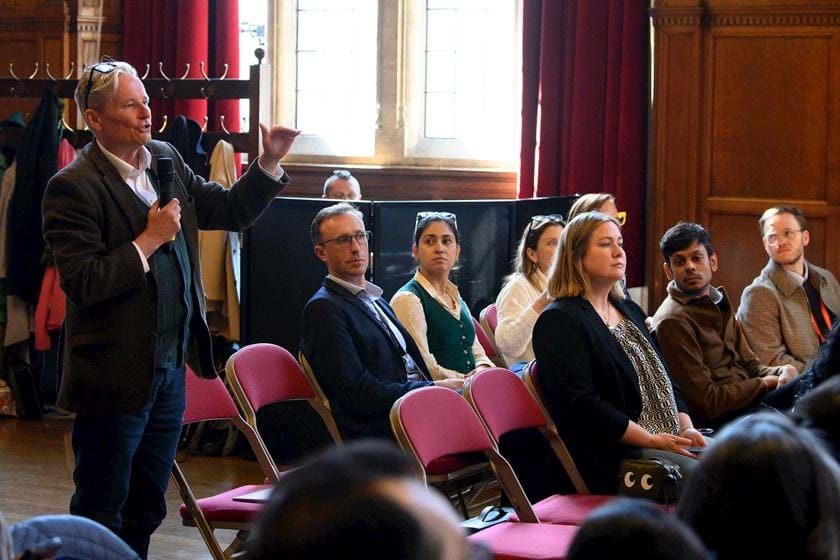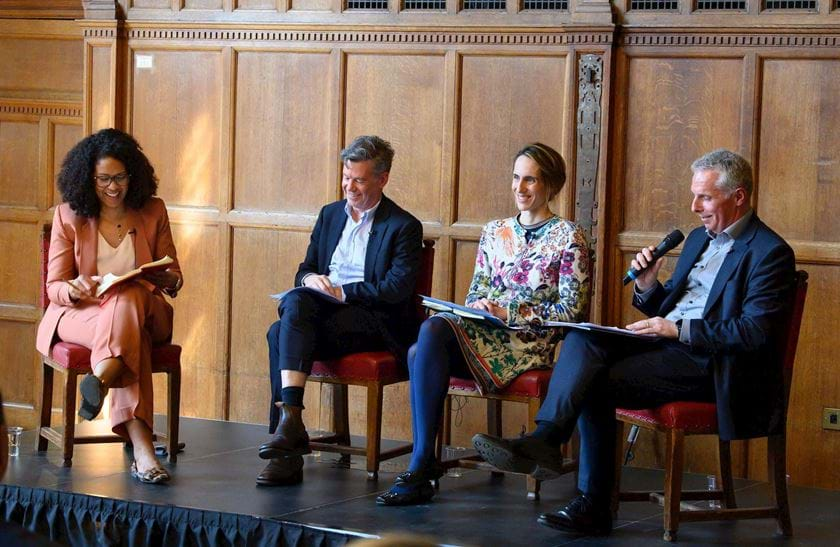Grant Funding or Outcomes-Financing: What is the Best Path to Social Impact
How do we maximise every penny for social impact?
That's the question that was debated last week at a British Asian Trust organised event in Oxford during the Skoll World Forum.
Set against the backdrop of escalating global challenges and shrinking aid budgets, we brought together a panel of experts to debate 'Grant funding or outcomes-financing: What is the best path to social impact?’.
The event was moderated by British Asian Trust Chief Executive Richard Hawkes and the panellists were:
- Mila Lukic – CEO, Bridges Outcomes Partnerships
- Natasha Kwakwa – Global Head of Community Impact, Standard Chartered Bank
- Nick Grono – CEO, Freedom Fund

As global challenges escalate and aid budgets shrink, we find ourselves faced with a very important question: How can philanthropy innovate to maximise every penny for impact?
Outcomes-focused instruments link funding for development projects to the achievement of results, but the added accountability requirements of the approach inevitably raise questions around cost and complexity. So, together, we navigated both the tensions and synergies between grant-based and outcomes-based funding, discussing how we can collaboratively scale solutions amidst financial constraints and adapt philanthropy to support the Sustainable Development Goals.
We kicked off the debate with Freedom Fund CEO, Nick Grono's passionate defence of grant funding. “Complex, difficult issues do not always fit into rigid outcome frameworks and require sophisticated systems-based approaches that focus on adaptability, collaboration, and long-term impact”, he asserted, underlining the risks of focusing only on projects and activities that are easy to measure.
This was followed by a powerful counter by Mila Lukic, Founder/CEO of Bridges Outcomes Partnerships, who argued that innovation is the best way to attract more funding into the sector. He suggested that outcomes funding ensures greater flexibility and cross-sector collaboration, pushing organisations to deliver better results and remain accountable, helping them better visualise their targets and mobilise scarce resources more effectively.
We then heard from Natasha Kwakwa, Global Head of Community Impact at Standard Chartered Bank, who provided a more balanced perspective given that her organistion proactively supports both grant and outcomes funding globally. “I do see outcomes funding as an option to free up more financial capital for social impact”, she said. “But we must ensure that the mechanism suits the cause, driving additional capital into the sector and not detracting from it.” She passionately affirmed, with unanimous agreement from the room, that target populations’ voices must be incorporated into programme design, ensuring that funding supports outcomes that they value.

We jumped straight into rebuttals and audience questions,and as the debate heated up, these were the key tensions that emerged.
- Do we risk wasting crucial resources when outcomes are not clearly defined? Or does an outcomes approach limit our impact to activities that are easy to measure?
A key argument in favour of outcomes-funding was accountability and improved performance owing to rigorous evaluation and contracting around clearly defined outcomes, leading to better results and greater transparency.
Nick strongly asserted that it is a fallacy that grant-based models are not interested in outcomes. Another audience member warned against importing corporate models into the social sector, expressing that impacts like change in attitude or confidence are not always measurable but nevertheless have tangible implications for long-term transformation. We discussed the importance of trust-based relationships in driving local movements and community-based organisations, especially in politically unstable environments where investment is discouraged.
- Could outcomes-based funding really revolutionise social impact? How do we rationalise supporting systems where the private sector gets returns on investment as profits?
Responding to fears around private sector involvement, Mila noted that the outcomes model could bring in more money into the sector that would not otherwise be accessible, mobilising both public and private actors across the funding ecosystem. Natasha agreed that corporations in particular view philanthropy as beneficial for their reputation and community relationships, suggesting that focusing on outcomes could help “attract and incentivise them to give more.”
Richard Hawkes, moderator and Chief Executive of the British Asian Trust, drew on his experience with the Quality Education Development Impact Bond (built on a financial model where at least 80% funding goes to delivery partners), acknowledging that it forced the British Asian Trust to transcend existing boundaries, “collecting data and evidence to embrace new, more efficient ways of working”.
- So who defines ‘outcomes’ and how do we drive sustained grassroots change? Is there room for negotiation?
Together, we discussed how we can share learnings as a community to create more holistic and inclusive systems of measurement, that can accommodate both grassroots and systems-level approaches. We strongly agreed that target populations’ voices must be incorporated into programme design, ensuring that funding supports outcomes that they value. Adaptivity and flexibility were frequently mentioned, with an emphasis on building funder relationships where bottom-up feedback and negotiation are valued and encouraged.

Despite our best efforts to divide the audience, we all ended up agreeing more than we disagreed! We all accepted that there is no single silver bullet that can solve it all. Outcomes funding is an innovative solution that can drive improved programme performance and cost-efficiency and bring new funders into the space, but it may not work in all circumstances. And while grant funding is a powerful tool that can empower changemakers, there has to be more accountability and rigour.

